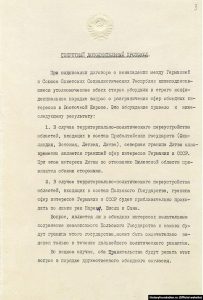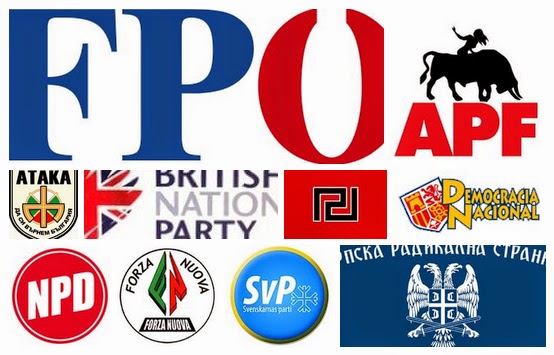How does the Ukrainian view compare to that in other areas of Europe and to that in Russia? Is it possible, or necessary, to find a common understanding of the war? These are some of the questions raised during the online discussion '"Don't mention the war": does Europe need a shared historical narrative of WWII?'.
This year, May 8 marks the 75th anniversary of the end of World War 2. Just prior to the commemorative date, the Ukrainian Institute of London and the British think tank - the Henry Jackson Society - organized an online discussion among noted historians and intellectuals about the possibility, or expediency, of finding a shared narrative on World War 2. This war seems to be a never-ending issue. It even came up during Brexit, when calls were made for the British to “get rid of German control” and vote to leave the EU, or in Russia, which continues to spread the myth of its “Great Patriotic War”, with one of the consequences being the justification of the occupation of Crimea and aggression in Donbas.

Moderated by US Atlantic Council expert Adrian Karatnytsky, the discussion included Professor Serhii Plokhii, director of the Harvard Institute of Ukrainian Studies, Polish philosopher and writer Krzysztof Czyżewski, British historian Brendan Simms from the University of Cambridge, and Ukrainian researcher and activist Nataliya Popovych.
Adrian Karatnytsky opened the debate referencing a speech by prominent American historian Timothy Snyder
, who, speaking in the German Bundestag almost three years ago, said that it was not Soviet Russia but Ukraine, the Ukrainian SSR and modern Ukraine that were the primary target of the Nazi “Drang nach Osten (Drive to the East), and that the Germans did not intend to occupy more than 10 percent of Russian territory.

Ukraine’s agricultural lands constituted “the Reich’s strategic goal of eastward expansion”. It was the “bloodlands” (thus named after Snyder’s famous book) of Ukraine, Belarus, and Poland that suffered the most under two totalitarian regimes - Hitler’s and Stalin’s, and bore witness to the Holocaust during the Nazi occupation.
But, what is the importance of initiating such a discussion before the commemoration of the 75th anniversary of the end of World War 2 in Europe?
Adrian Karatnytsky gives four reasons.
First, Central and Eastern Europe were excluded from this debate for many decades. The countries in this region were not sovereign, and Ukraine was under a totalitarian regime with ideological restrictions. After the war, historical studies continued mainly in respective diasporas, and it became possible for these countries to write and study their histories openly only after the collapse of the communist regimes.
Second, the relations between these countries, which finally gained sovereignty and began studying and writing their own histories, have resulted in different narratives, which has often strained and sometimes improved relations.
Third, Russia actively uses history as a tool and interprets it in its own way. Moreover, Russian propaganda depicts it in a way that hides this history from being understood by its own society.
Fourth, the world does not have a good understanding of the suffering that befell Central and Eastern Europe, and does not even know that the number of fatalities during the war in Ukraine, Belarus and Poland was much greater than the number of German fatalities. Karatnytsky underlines that “even the losing side suffered less than the nominal winners”.

A study of media reports on World War 2, published in the previous two years, in Ukraine, Poland, Russia, Britain, France and Germany was presented during the discussion. Nataliya Popovych, co-founder of the Ukrainian Crisis Media Center, stated that publications in 45 media outlets in six countries had been examined.
Popovych noted that the German media focused mainly on the causes and consequences of the war. The British – on Winston Churchill’s role and the reasons for the British Empire’s disintegration after World War 2. The French press concentrated on rethinking and reinterpreting the events of 1939-45, and the Polish press was focused on Poland as a victim of two aggressors - Nazi Germany and the USSR.
But, the media did have a shared view of the Ribbentrop-Molotov Pact as an agreement that divided Eastern Europe into German and Soviet spheres of influence.

Ukrainian media often mention the Ribbentrop-Molotov Pact in connection with current events, in particular, the Russian-German Nord Stream-2 pipeline. In addition, Ukrainian media (with the exception of the pro-Russian website strana.ua) do not use the term “Great Patriotic War”, but prefer World War 2 instead.


According to Popovych, Ukrainian media have little understanding of the role of the USSR as a liberator or an occupier, or as a combination of both. There is also little understanding of the Yalta Conference and the UPA (Ukrainian Insurgent Army) in Ukraine. Popovych argues that this indicates an “artificial decommunization of Ukrainian consciousness”.
Meanwhile, the Russian media justifies the Ribbentrop-Molotov Pact as “a strategic necessity to curb Nazi German expansionism”.
During the discussion, the online audience was asked to vote on the need to study the Ribbentrop-Molotov Pact in European schools, and 90 percent of several hundred people voted in favor of such a measure.


Harvard Professor Serhii Plokhii noted that the further we move away from this historic period, the more interest we show in studying World War 2.

“East European history is a history of redrawing the world map, in particular the map of this European region, rethinking and challenging the order established by Russia after the end of the Cold War. History is actively used as a weapon in intellectual debates, both in wars and in conflicts, such as in Ukraine today. World War 2 stands at the centre of the war that’s being waged in Ukraine today. The history of the Second World War, called the Great Patriotic War by Russia, has been turned into a weapon by Russia in its occupation of Crimea and in the Donbas war.”
Plokhii argues that the myth of the “Great Patriotic War” is used as a fundamental myth, as the cornerstone of the new Russian state, established after 1991.
“It’s also a way to somehow unite people around memory and history, underlining Russia’s power and greatness.” adds Plokhii.
What about Ukraine?
Serhii Plokhii maintains that Ukraine has failed to develop a shared narrative for the country, and there are several reasons, namely Russia’s aggressive promotion of the myth of the “Great Patriotic War” and the lack of unity in Ukraine due to two different narratives - the liberal one, which wants to incorporate Ukrainian history into global history, and the nationalist narrative, which maintains that that until 1991, Soviet historiography always portrayed the UPA and struggles for independence as negative phenomenons.
“Today, Ukraine is a major battleground in terms of narratives and different understanding of what transpired in World War 2. I believe it will be an important step for Europe and the world if Ukraine finally manages to reach a consensus about the Second World War.”

British historian Brendan Simms explained that the British media saw World War 2 as a positive event in that Britain decided on its own to enter the war against the Nazis, unlike the other victorious Allies… because Hitler declared war against the U.S, while the Soviet Union established an agreement with Hitler, or at least they tolerated each other from 1939 to June 1941.
As for Germany, Simms believes that German society is aware of Germany’s responsibility for Nazism and the Holocaust.
“It shows us the positive side of the story - albeit of a different kind - of how a country should look at its past.” Simms said.
Polish writer and philosopher Krzysztof Czyzewski thinks that the title of the webinar “Don’t mention the war” means that “the war is still with us, it’s an ongoing challenge for all of us, and we haven’t yet overcome it”.
Like Professor Plokhii, who believes that there is no shared narrative in Ukraine, Czyzewski believes that it is difficult to find a shared approach to this period of history in Poland, as well as in other countries.
“It’s not a problem between countries, or between different nations, but it is an issue within each country, within societies that are increasingly divided on issues of tragic historical memory - especially about World War 2.”
Czyzewski believes that it is important to consider the Second World War as a European war that destroyed Europe, a war that forced Europe to rebuild its foundation and look to the future towards the creation of the European Union and a coherent European integration policy.
“There are major problems regarding integration in Europe, and they are largely due to the fact that little serious work has been done on a shared historical narrative.” explains Czyzewski.

Striking a raw nerve
In the end, Adrian Karatnytsky asked whether it was possible to build a Ukrainian and Eastern European narrative against the background of all the tragedies and losses suffered by these countries during occupation.
“In my opinion, a lot of emphasis has been placed on both heroism and collaboration, but less attention has been paid to the huge sacrifices made by ordinary people, who weren’t necessarily politically motivated or had strong political convictions.” says Karatnytsky.
He argues that there is an ongoing myth about Belarusians, Ukrainians and Lithuanians being “mostly collaborators”.
“But, when it’s all about their fatalities or their fighting in different armies against the German occupation, and later, against the Soviet authorities, they are again mentioned in the context of anti-Semitic acts. Shouldn’t some kind of balance be found here?” he said.
Serhii Plokhii was ready with his answer:
“Stepan Bandera is at the centre of many discussions in Ukraine. Bandera always strikes a raw nerve in Ukrainian society. This issue is generally related to nationalist movements in Europe in the interwar period and during the Second World War. Unless we find an answer, and stop sweeping it under the carpet, we’ll never reach an understanding.”
Plokhii also noted that Ukrainian nationalism should be beyond the accepted paradigm of hero-criminal and victim-perpetrator.
“Society must take a more nuanced approach and must analyze historic events more carefully.”
A frequent question was tossed back and forth: Is a shared historical narrative necessary and is it at all possible?
“A shared narrative doesn’t refer to a narrative proposed by one side or another. We’re still stuck in victory-type historiography, i.e. studying history from the winner’s point of view. But, a shared narrative should include the experiences of many people. Can a shared narrative also be a mutual understanding? The same thinking? Or does it mean joint discussions, exchange of ideas, etc.?” mused Karatnytsky.

Towards the end of the webinar, Polish write and philosopher Krzysztof Czyżewski made a moving statement:
“Achieving a unified narrative is utopia, totally unrealistic, but we’re talking about something else – namely, building a shared narrative, overcoming our limitations. We need to give more space to other memories, to understanding others, to feeling compassion for others. If you’re self-centered and focused only on your memory, on your own past, others will not hear you. If you’re open to others, then others will hear your pain and suffering.”




